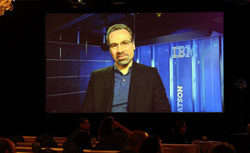David Ferrucci, Lead Researcher for IBM's Watson Project
How do you improve on a computer that beat the world's best Jeopardy! players? Have Watson team up with humanity.
When IBM's question-answering supercomputer Watson soundly defeated two Jeopardy! champions in February, it looked like curtains for humanity. Sure, computers had beaten people before—at chess, Scrabble, sometimes Go, among other games—but this was different. Jeopardy! is all about fighting through thickets of language—puns, idioms, homonyms, homophones, and other quirks of English that seem uniquely suited to humans. The fact that a computer could understand this wordplay, let alone thump some of the best people who'd ever played the game, felt like a moment of eclipse. And if, in a decade or two, the machines have taken over, we'll have one man to thank: David Ferrucci, leader of the Semantic Analysis and Integration Department at IBM's T.J. Watson's Research Center.
Ferrucci, an artificial-intelligence researcher who specializes in teaching computers how to understand natural human language, has repeatedly downplayed the notion that Watson's Jeopardy! victory portends humanity's decline. Computers are getting better at understanding us, he says, but they still need a lot more training, and that training can only come from collaboration. As machines get better at finding information, Ferrucci says, they'll "dialogue with the user trying to find out what they need," and this back-and-forth will generate the precise answers that today's search engines too rarely deliver.
Ferrucci says IBM is already in talks to implement parts of Watson for a few of its customers, but the really amazing stuff will take a few years to debut. In fields like medicine and law, humans—both professionals and the public—must sift through huge amounts of data to find answers to common problems. (Search Google for ways to treat your headache and you're likely to come away thinking you've got a brain tumor.) A Watson-like machine would step in to do these "high-value" searches for us, Ferrucci says. Even more importantly, the computer might sit between you and your doctor as a kind of intelligent mediator. You'd enter your symptoms, the computer would dive deep into everything that's known about your condition, and it would present possibilities to your doctor, including suggestions for follow-up questions she should ask you. "This would be something you'd use anywhere you're trying to make high-value decisions," Ferrucci says.
Because Watson's powers increase as computers get faster, and because it learns from its conversations with humans, it's bound to keep getting better. Still, Ferrucci says that researchers continue to look for ways to teach machines language—the technology is still in its infancy, and thorny problems remain. "Language is just hard, and it's hard for a fundamental reason—to the computer it's just symbols, and for the human it's a map to actual experiences," Ferrucci says. Thanks to Watson, we're finally getting closer to understanding each other.
Read a Q&A with David Ferrucci.
Read Ferrucci's essay on the challenges of designing a computer that can understand human language.
Check out the rest of our technology Top Right:
Cynthia Breazeal, director of the Personal Robots Group at the MIT Media Lab.
Jeff Bezos, founder and CEO of Amazon.com.
Salman Khan, founder of Khan Academy.
Brian Tucker, president of GeoHazards International.

